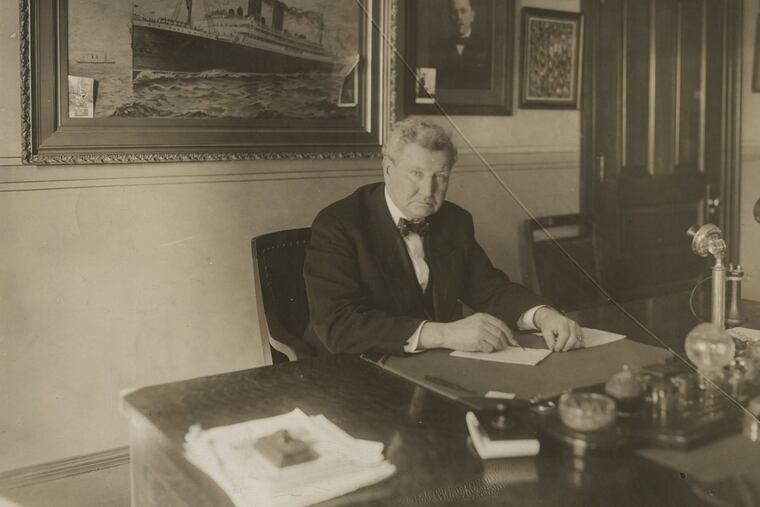Pennsylvania's William B. Wilson was a labor pioneer | Perspective
Pennsylvania's role in the labor history of the United States dates back to the nation's earliest years.

This spring marks 105 years since President Woodrow Wilson appointed William Bauchop Wilson as the nation's first secretary of labor. A Scotsman-turned-Pennsylvanian, William Wilson bridged a gap few labor activists could during the early 20th century, garnering trust from labor activists and employers alike while enacting policies that improved workers' lives.
Pennsylvania's role in the labor history of the United States dates back to the nation's earliest years. In 1786, print-makers in Philadelphia staged the first-ever U.S. strike and triumphantly secured $6 weekly minimum pay. Though this early experiment in labor activism succeeded, workers struggled against immeasurable odds in their efforts to organize throughout much of the nation's history, often facing state-sanctioned violence.
William Wilson grew up in an environment equally hostile to anti-labor organizing across the Atlantic. He was born in Blantyre, Scotland, in 1862 to a coal mining family. His father, Adam Black Wilson, participated in a 1868 miners' strike in Haughhead, Scotland, that landed him on a blacklist. Unable to find work in his native country, the older Wilson immigrated to the United States in April 1870, settling in the village of Arnot in northern Pennsylvania. He saved enough money to bring his family over four months later.
In a personal account reflecting on his arrival in Pennsylvania, Wilson wrote, "The first things that caught the eye were stumps and stones and rough board houses, not a very pleasant picture to one who had been accustomed to the well groomed surface of the valley of the Clyde."
While life was difficult in his new home, Wilson found refuge in reading and inspiration from the passionate immigrant worker community of Arnot. He borrowed books from Hugh Kerwin, a highly literate cobbler who regularly hosted nearby workers to discuss intellectual matters. "As I look back on the group of men that formed our little circle in the early days at Arnot, many of them classed as illiterate," Wilson wrote, "I am still amazed at the knowledge they possessed of many religious, social, economic, political, historical and scientific questions, their wisdom and tolerance in discussing them."
Wilson began mining when he was 9, helping his father load cars in the mine. By age 14, Wilson began serving as the secretary for the region's Benevolent Association local, thus beginning his long career as a labor rights advocate.
Upon entering adulthood, Wilson leveraged his extensive union experience to help found the United Mine Workers of America (UMWA) in 1890. He became a member of the union's National Executive Board one year later. Wilson played a key role in the pitched labor battles of the 1890s, during which activists fought for eight-hour work days and better pay. This tense period had its share of bloodshed, such as the Lattimer Massacre in Luzerne County that left 19 unarmed miners dead. Wilson was arrested on multiple occasions, and he spearheaded strikes alongside the famous organizer Mary "Mother" Jones near his childhood home in Arnot.
Having risen through the ranks of the UMWA, Wilson decided that he could make a bigger impact in government. In 1906, Wilson began the first of three terms in Congress as a Democrat. Despite witnessing the horrific treatment many workers received at the hands of employers and their armed strike-busters, Wilson maintained a moderate political worldview, arguing that political extremes inhibit the "fullest and best development of the human race if carried to their ultimate conclusion." This made him palatable to business owners, including William S. Nearing of the Morris Run Coal Co., who deemed Wilson "a constructive man, a friend of capital as well as of labor, and one whom no just man need fear."
Wilson's general popularity and ability to reconcile opposing sides made him a great fit for the newly minted role of secretary of labor in the Wilson administration. The Historical Society of Pennsylvania houses Wilson's private files and mementos from this period, which document the establishment of the Department of Labor during Wilson's tenure. He oversaw a number of programs that facilitated compromise between workers and employers and that improved the working conditions of women.
Wilson served as secretary of labor until 1921. After a failed congressional run in 1926, he returned to Tioga County to farm. He died on May 25, 1934.
Patrick Glennon is a communications officer at the Historical Society of Pennsylvania. pglennon@hsp.org